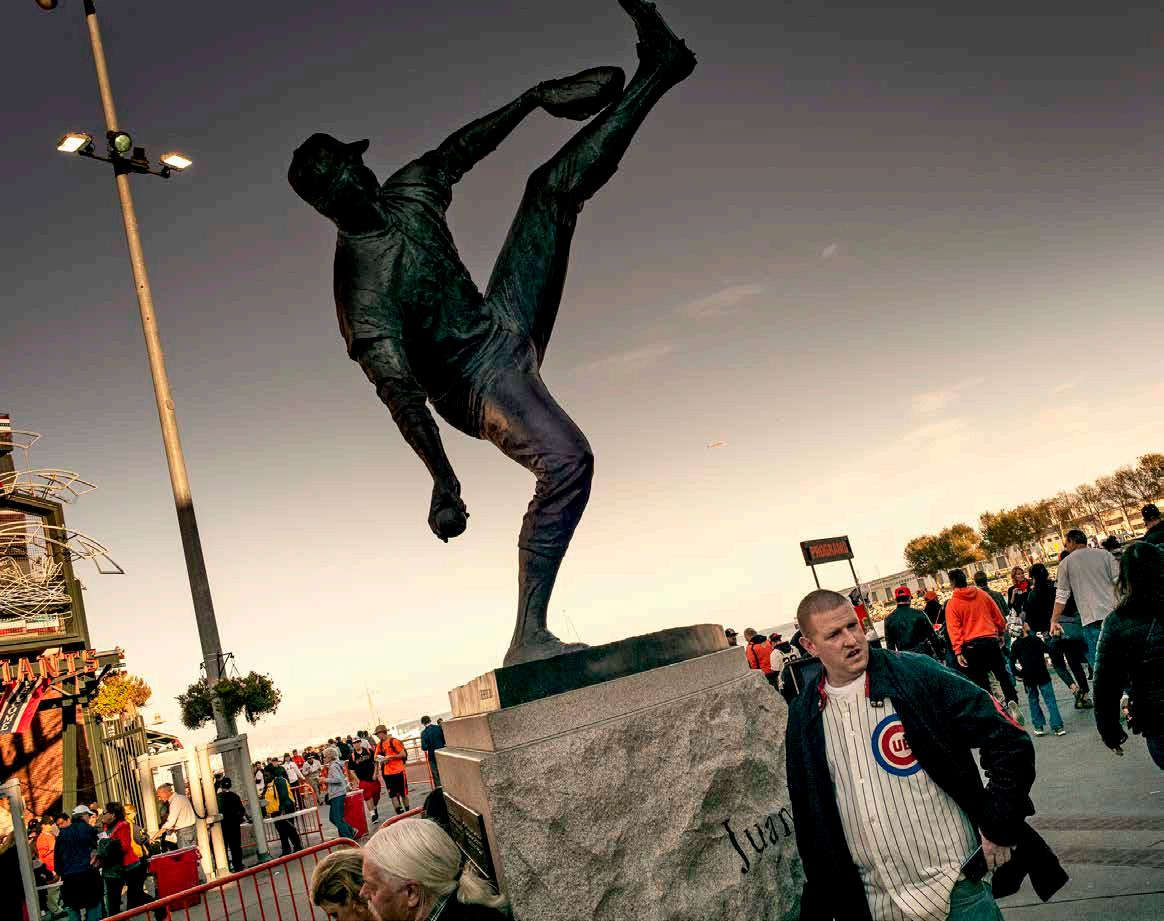

SoMa The South of Market District
SoMa is loosely bounded by Market Street, the San Francisco Bay, and the corridor formed along Division Street-13th Street.
But before SoMa was SoMa this area was dominated by docks, meatpacking and light manufacturing, and the support that industry brings such as: warehouses, transport, working class eateries, and housing for all manner of the working class: day labors, seamen, dockworkers, warehouse worker and service workers.
All things change. This economic center based on manufacturing, service, transport and trade, changed as the docks closed down and redevelopment started. The area attracted artists, music venues, the gay community, and eventually two sports venues (baseball and basketball), hotels, upscale housing and eateries, museums and a convention complex. Much of the district invested heavily in tourism.
With it’s massive amounts of vacant space - both land and buildings - venture capital
started pouring money into medical, new tech, information management and social networking startups. Supporting business and services followed changing the landscape and the culture.
SoMa’s sub-neighborhoods, such as like Mission Bay and the Design District, or the less developed Division - 13th Street cor ridor, are also the neighborhoods of many of the city’s unhoused. They live sleeping rough or in transient tent encampments, forced to move every few days to few months, but usually staying in the neighborhoods they call “home”.
A few who make the six square block area around Division and Towsend their home are on the following pages. .
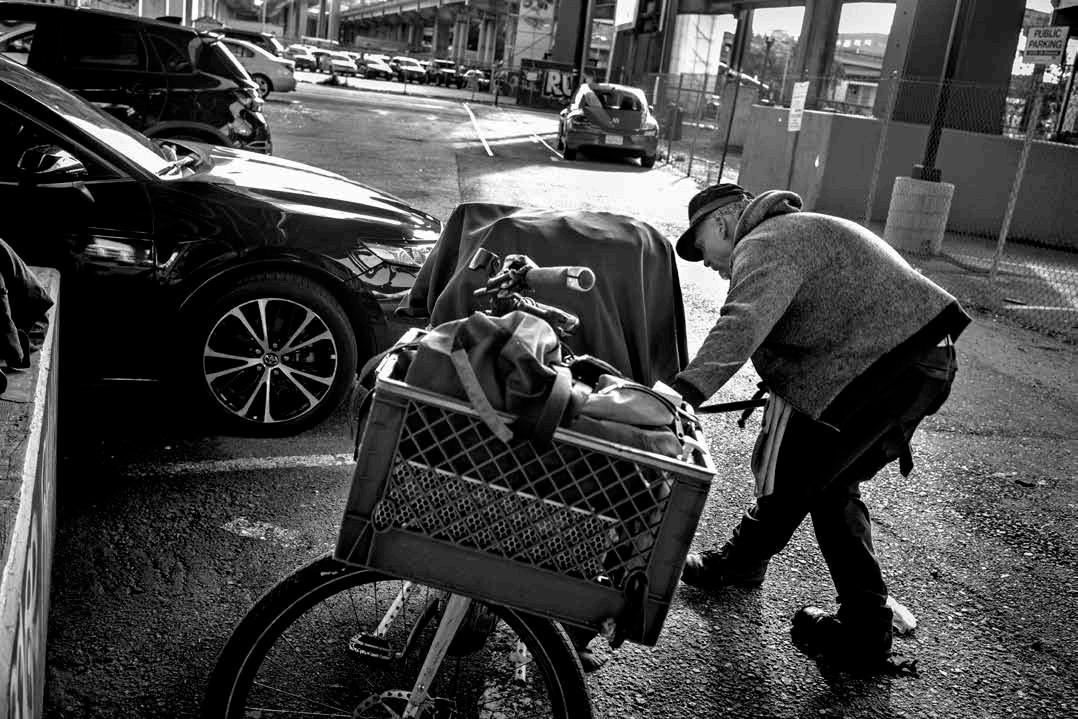
Residents
“One of my close friend’s and my ex’s dogs had a litter and I had the pick of the litter. She means the world to me. She’s like my daughter. I’ve named her Patience because you got to have a lot of patience dealing with her. She’s a handful. She helps me get through a lot of things - I’d probably be in jail, or somewhere doing some thing I shouldn’t be doing (without her). My name is No and her name is Patience because I have no patience.”
[What do your belongings mean to you?] Noth ing. They’re just materialist. They don’t mean nothing to me. I don’t put a price on them. I don’t cherish nothing but family and loved ones. I mean I like my things, but I don’t cherish nothing.”
“I like to call (the people living on Dore) my fam ily. We look out after each other, make sure each other eat, watch each other’s dogs, make sure we have the things that we need to survive every day.”
Name and age: James Jones, 35
Date: 18 November 2021 Place: Dore Street Without a home: Off and on for about 13 years
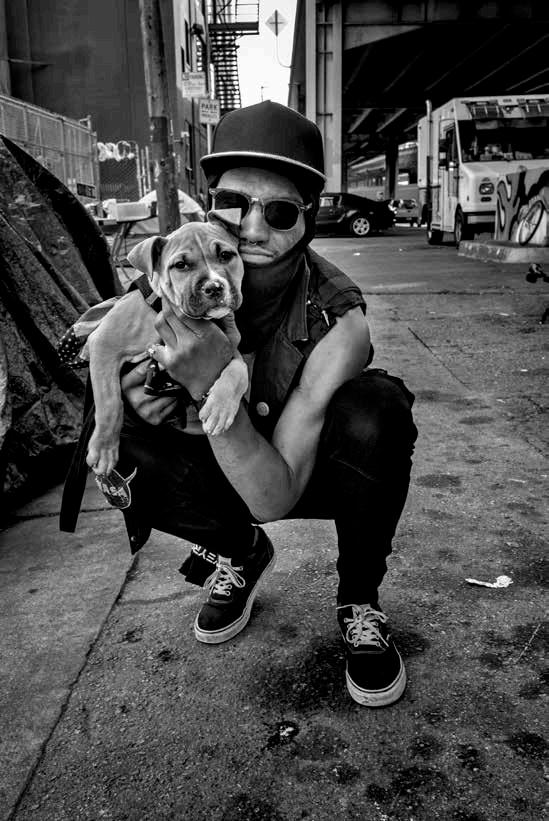
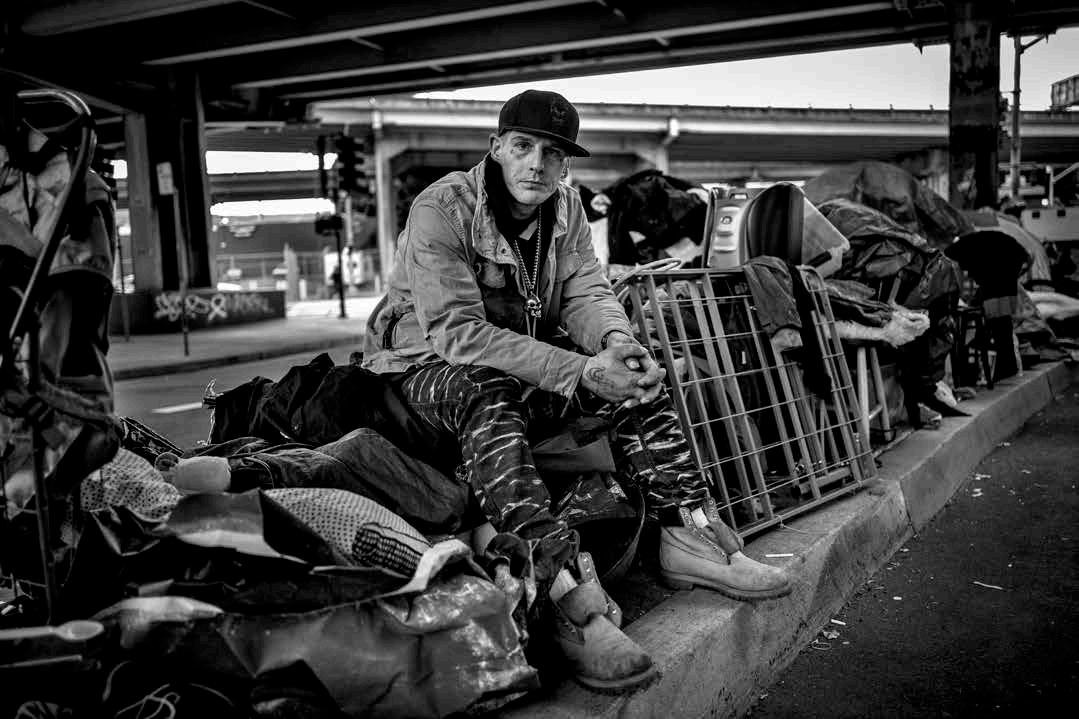
“Prior to our electricity being cut off we had electricity in Dore Alley (Dore Street); right before the first rainstorm hit some men in trucks came and shut all the power off and left us powerless. We tried to reconnect (but) you can’t reconnect the power because they shut all the fucking power off. So, the next best option was this divider (the meridian in the middle of Brannan) because across the street, in the ground, is electricity so we’re able to splice and connect extension cords together and have electricity. It means I don’t freeze, me and my girlfriend and dog, don’t freeze. It means we can eat. It means everything! How can you eat without power? How can you have lights? How can you charge your phone? How can you do anything without electricity? You need it. You can’t live without it. It’s a ne cessity that everybody should have, running water and electricity. I mean I have to shit in a bag in my tent and dispose of it because there are no bathrooms to use. It’s the most em
barrassing thing in the world to have to run and grab a trash bag, run into your house, take a shit and tie it up. To bath myself means I get boohoo naked and take baby wipes and wipe down my body because there’s no place to shower. If I had a way to pay for power, I’d pay for power. But I don’t, that’s the way it is.”
“[Shelters], it’s too dangerous for my girl (partner) and I. Every rapist and child molester is in shelters. That’s their safe haven. Any policeman will tell you that.
[For an SRO*] “they could take all this away just so long as I had my cloths, my girl and my dog.”
“[Relationships on the street], it’s a lot of work. It’s a lot of dedication, a lot of loyalty and … a lot of love. It’s almost impossible to do it, but if you can, you can. It’s, it’s … ah man I get chocked up, it’s hard. It’s hard. If you can make it through this (home lessness) in a relationship, you’ll be
together forever. I mean you have to accept the person for everything they are, their flaws - all the good, the bad, the ugly. Being homeless brings out the most ugliest, ugliest out of you. And drugs, takes a lot of drugs (laughs). Na, it’s just really love and dedication. You have to really want to be in the relationship. If you don’t want to be in the rela tionship, then it’s going to show and that’s it.”
“[Having a relationship means] everything. It means I don’t have to be alone.”
.
*SROs are a single room with a shared bathroom down the hall. Run by different “non-profits” there are rules governing belongings, pets and partners. Generally you don’t have keys and you are searched coming in.
[Home] “means the group of friends that I’m around that I recognize as my family and, ... my truck.”
“Dealing with illnesses [is the hardest thing about being on the street] because when you go to the hospital they don’t want to help you. Your homeless, they just don’t want to help you. I need medical help. I have issues with my health that are not getting addressed because every time I go into the hospital to get help they tell me I’m crazy. Or they just don’t want to fuck with me because I’m home less. It’s wrong, man.”
[The most important thing to me] “my friends. Be cause that’s all I got really. I don’t have no family.”
“They (the City) need to be giving some of that money that they get for the homeless to the homeless, instead of stealing it all, or making up all these bullshit jobs for people. They need to be making housing for us. It’s just all a big scam. It sucks. I al ways knew they were going to start putting people in camps and that’s exactly what they’re doing (the “safe camping sites”), and they’re just lining their pockets the whole time.”
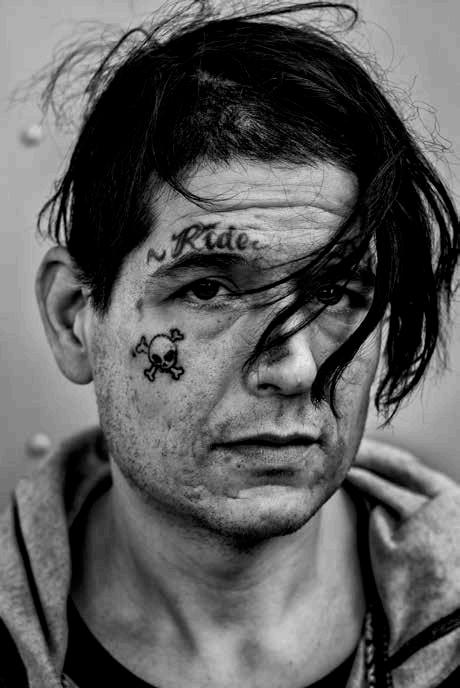
Name and age: Monde Bustamante, 46
Date: 28 October 2021 Place: His converted steep van parked on Dore Street Without a home: “I’ve been on and off the streets since I was 16.”
“Home’s a safe place, any where’s home for me.”
“DPW* [has taken my stuff] three or four times; soon as they get it, they dump it. Soon as they get your stuff, they dump it. They don’t give you the opportunity to get it back. I tried that. You’re supposed to get a signature on paper [when DPW takes belongs] and all that, it never happened.”
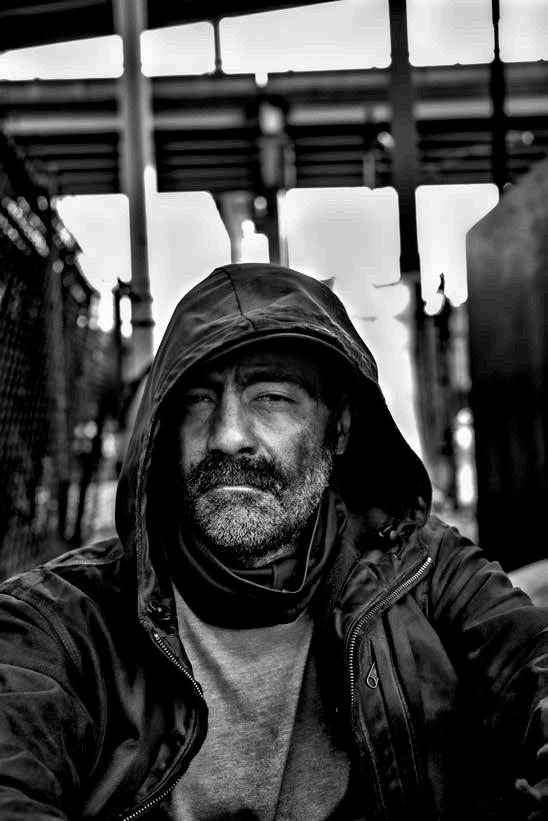
.
*Department of Public Works
Name and age: Robbie LaBono, 45
Date: 08 October 2021
Place: Division Street between Vermont and San Bruno Streets
Without a home: 5 years
Name: Lafebre Hoskins, 29 and Mia Caballero, 31
Date: 29 October 2021 Place: Division and Florida Streets Without a home: About 3 years
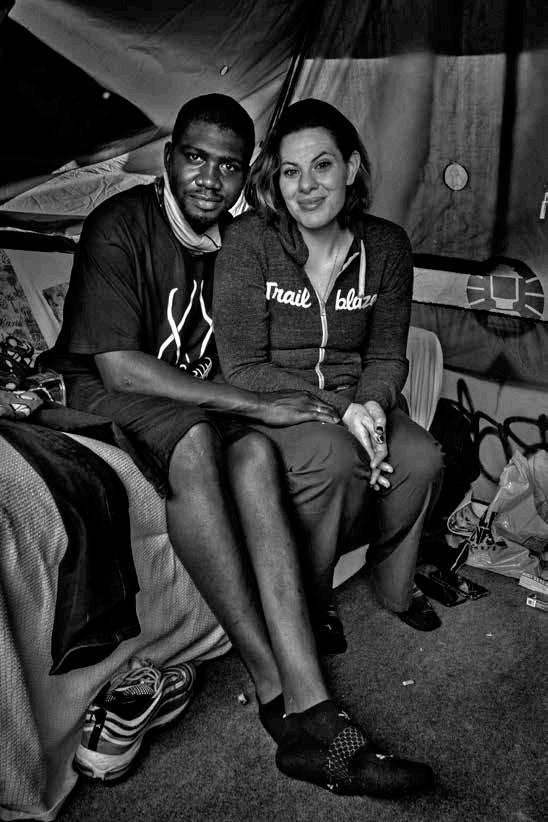
“Food is a big part of community.
I know even on the streets I’ve made food for people and had people cry and say they can’t remember the last time they’ve had something close to a home cooked meal. When you cook people come outside, they smell food and stop by. It kind a of brings people together.”
[In the “safe camping sites”]”... because of power issues, I guess, we couldn’t have appliances – microwaves, little “George Foreman Grills”, whatever, and it made the place really boring. Normal ly when people cook it ends up being a gathering of people and everyone’s talking and having fun. Cooking with community, it puts people in a better mood. Now it’s just kind a of dead. No one comes out of their tents, and it’s depressing. There’s no more social life. It seems like anything that you could do to give yourself joy, that would take the edge off
a little bit from being in the street and being homeless, they’ll (the authorities) take away.”
[On being a woman on the street]
“I’m lucky, I have my boyfriend with me but there are times that I’m in the tent by myself. People will wonder by; I’ve had people follow me back to my tent. I’ve had people just sit outside my tent and wait for my boyfriend to leave, for me to be alone. Yeah, if I was alone I would really, really try hard to be hidden. Or try and be in a shelter.”
“It’s sad there are a lot of girls that are out here by themselves that have mental issues that are, you know, helpless. They get targeted. There are plenty of guys that’s what they target, the crazy girls because they feel like they’re easier, they could do whatever they want with them. I have a few friends that their girlfriends, they’re not the same people.
They went with the wrong per son, or did the wrong drug, and they’re crazy now. It’s sad but it happens a lot. My friend went through it with his ex-girlfriend and now we have a friend that’s going through it with theirs. I’m lucky that I’m with my boyfriend and we don’t have those types of problems to deal with. But I know a lot of people that do.”
“Really, I think the scariest thing is the people that are on the street that have serious mental issues. I don’t know. It’s scary because you’re kind of helpless because they may not be aware of what they’re doing.”
“With the covid thing people you would never imagine would be homeless, and they are. It could happen to anybody. It’s messed up to dehumanize somebody be cause they don’t have a house.”
Mia Calallero“Home is the place that I live. I don’t consider myself homeless, I consider myself an urban nomad. I came out here by purpose and by decision. I wasn’t driven out here by economic need.
“[I’d move back inside] on the condition that it had a bathroom and a kitch en. I’d been promised a bathroom and a kitchen the last time I got involved with social services through the HOT (Homeless Outreach Team) team and then they forced me into an SRO. I will never share my bathroom with anoth er human being again. I won’t do it, stay in a place and climb in and out of a jailhouse bed every night. I’m not climbing out a jailhouse bed unless I’m actually in jail and that’s what these sanctuaries and shelters are. They’re little, bitty dormitory jails where they let you go out in the daytime, and I’m not staying in one. I’m not staying in a dormitory unless I’m incarcerated.”
(What would make life easier on the street?) “More regular bathrooms!
Bathroom access, bathroom access, bathroom access! I’ll say it again, Bathroom Access! I think the City should
provide a whole lot more bathrooms and showers everywhere considering they facilitate homelessness on a regu lar basis.”
“Social services is a joke because it’s designed to work in a circle. It’s designed to get you into a dormitory like situation. Or SRO where they can basically enforce prison tactics of not letting people associate in their homes. They separate us and only want us hanging out in the street.”
“When I got out of prison I got disabil ity and I decided to make some major changes in my life. I live on my disabil ity augmented with little street sales, mostly legal. There are a set rules that let you live here in the city and the cops will just leave you alone, even help you out in various ways. I found out that my lifestyle is much more free in this tent than it was in an SRO. The dignity that law enforcement gives me when they tell me I have to move my tent is so much more noticeable than it is when I’m in an SRO and the manager feels like she can come in my room anytime she wants.”
Name and age: James Daniel Laughter, 59
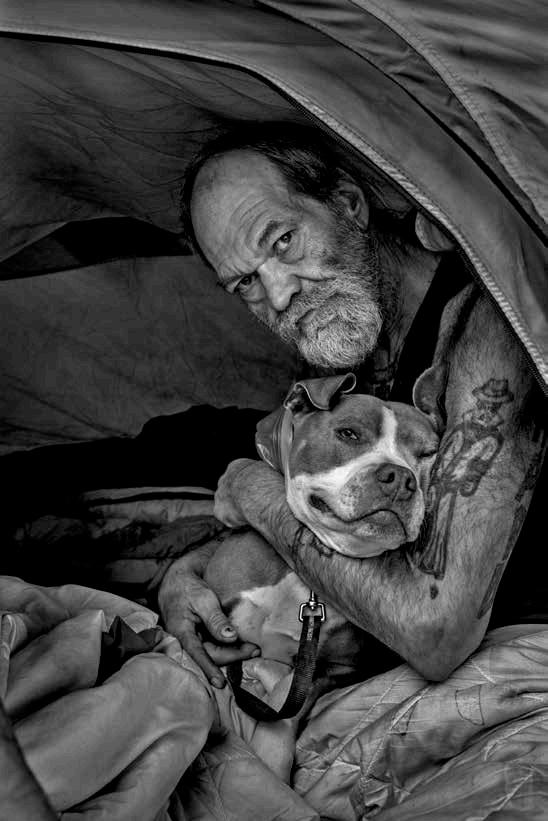
Date: 17 January 2022
Place: San Bruno Ave between 15th and Alameda Streets
Without a home: 6-7 years without a roof over my head
Credits
A Coffee and Donuts publication
Photographs, recording and design: Robert Gumpert Words by those pictured. ragumpert@gmail.com https://robertgumpert.com
